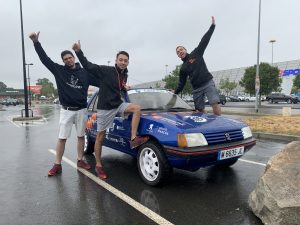SABINAR RAID TEAM DISCOVERS EASTERN EUROPE ON ITS SOLIDARITY ADVENTURE
emprendimiento, Estudiantes2, ingenieria, internacional, Proyección Internacional, sabinar raid, umh
18 November 2019
In August 2019, the Sabinar Raid UMH team, comprised of Miguel Hernández University of Elche (UMH) students, returned from their solidarity adventure, Europ’Raid: Eastern Adventures. With support from the Vice Rectorate for International Relations, Alfonso Ases and Borja Gallud, both UMH industrial engineering graduate students, along with Manuel Arnau, a UMH mechanical engineering undergraduate student, drove through 22 European countries while behind the wheel of a 1989 Peugeot 205 automobile. During the 13,800 kilometers and 22 stages, they delivered 100 kilograms of solidarity material.
One hundred and fifty European individuals, which included youngsters in orphanages, people with functional diversity, and others in processes of occupational and/social integration, were the recipients of this solidarity material that the Sabinar Raid team delivered. Of the material donated, footwear, cold weather clothing, and school supplies stand out. “This kind of material is highly valued by the social centers and schools, given the extreme winter temperatures there,” says Alfonso Ases, the team’s founding member. The main purpose of these kinds of solidarity actions of volunteerism is to deliver necessary material. “Our collaboration is fairly small, but it enabled providing these centers and schools with supplies for the upcoming school year,” recounts Ases.
Most of the material was delivered in the city of Mostar, Bosnia and Herzegovina, and specifically at Los Rosales School. The Spanish government founded the school, but it no longer receives any funding from Spain. “Today, Los Rosales survives solely from donations; it receives no income, but it has a history that has made it deserving of a social integration initiative since its early beginnings, and so this was an incentive,” explains Ases. Other centers that received donations receive support from Eastern European governments, along with French and German NGOs that work in those areas.
The experience
For the team members, their solidarity challenge enabled them to gain a “global view of the whole of Europe.” As for his adventure, Manuel Arnau, a Sabinar Raid member who had not undergone an experience like this before, considers that “seeing less developed countries, places that adapt to what they possess, makes you value our good fortune that much more.”
Throughout the past 25 years, countries in Eastern Europe have been affected by civil wars that have left marks on their inhabitants, which is why they have their own initiatives for developing the most deteriorated and affected areas. “We were in places with extreme poverty, religious influence, and severe political conflict. In the young people, you see contrasts – they are always happy, but muted on the inside,” narrates Arnau.
Following his experience in countries such as Yugoslavia, Bosnia, and Greece, Alfonso Ases reached the conclusion that a closer relationship between European countries would be of great benefit. “We are undergoing a series of social problems that do not seem important. It would seem like there is nothing beyond Italy; that past it is not Europe. However, as soon as you become aware of the situation, you recognize that there are many similarities with our culture. We would all benefit if we developed together, more so than if everybody just looked after their own piece of land,” says Ases.
Despite the mechanical problems their car suffered, constant rain throughout the route, and the extensive kilometers traveled, Borja Gallud, the Sabinar Raid’s third member, affirms that it was among the most enriching experiences he has ever undergone and a tremendous cultural exchange. He finishes by adding that despite the different philosophies between the previous UniRaid in the Sahara Dessert and the recent Europ’Raid: Eastern Adventures, the affection he felt was the same.
